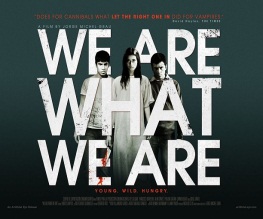We Are What We Are (Somos Lo Que Hay)

I really wanted to like We Are What We Are. With the advertising campaign promising a subversive, yet completely grim family satire in which the leads just happen to eat people, you could be forgiven for approaching the film with justified expectations of a Mexican Let The Right One In.
Opening with the family’s patriarch as he crawls through a well-lit shopping centre, finally surrendering to fatal indigestion, the narrative leaves an unbalanced mother and her three children to fend for themselves. With a hallowed ritual fast approaching, the family must put severed limbs on the table and continue their cannibal ways unaided.
The promise of exploitative horror, however, is quickly squandered by a notable lack of actual cannibalism. Delaying the films gore quotient until the last act, the filmmakers instead use the body of the film to pose somewhat heavy-handed allegory. While there are echoes of the lower classes feeding off one another, and although modern Mexico does receive quite an intense beating, the audience is never given much reason to wait patiently for the action to resume.

You see, while I accept that there is inevitably a time and a place for sentimentality, We Are What We Are takes such delight in the unpleasantness of its central players that there is a crippling shortage of reasons to invest in their promisingly macabre plight. A number of uneven subplots – which pose the issue of sexuality and tease the taboo of incest with mixed success – do little to build enough empathy to pay off the eventual dénouement.
Similarly disappointing is the discrepant tonality. Undeniably gritty with subversive aspirations, writer-director Jorge Michel Grau also segues into black comic territory with a parallel portrayal of Mexico’s inept police force. A scene which kick-starts the investigation, in which an autopsy on the deceased father unveils a partially digested finger, has humorous flourishes – touting Its A Wonderful Afterlife-esque possibilities. Sadly, however, this dimension disappears as abruptly as it arrived, returning the film to monotony and indifference.

Avoiding cheap scares or gags, We Are What We Are similarly fails to build tension due to its sprawling and confused structure. The underlying suggestion that cannibalism isn’t as infrequent in Mexico as the authorities would like to believe – bred from the polished way in which the fathers corpse is removed from the mall and the nonchalant manner in which the autopsy’s findings are presented – does build a degree of menace (and while the ticking effect produced by the families obsessive clock collection and some nice musical touches create an unnerving soundtrack) conspire to disconcert, any tension is quickly squandered by a jarring lack of action.
While the climax retains traces of its potential power, and a scattering of impressive performances feign to convince, We Are What We Are never warrants enough investment to affect on the level that it needs to. Although an admirable début, a shameless American remake might actually improve the narrative rather than compromise it.



Recent Comments